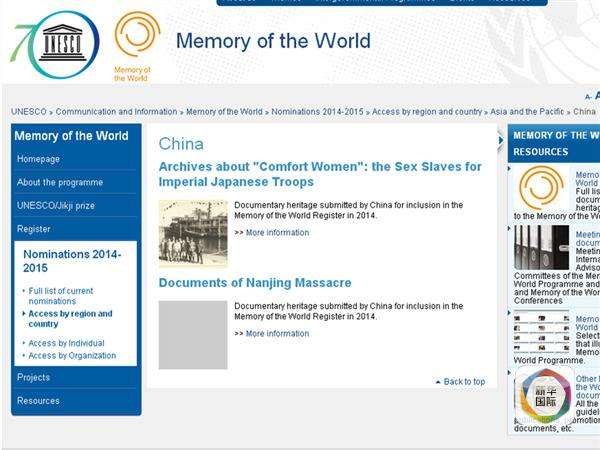
Tensions between the two Asian giants, China and Japan, are running high after the Japanese government tried to block China's application to UNESCO to list documents relating to the 1937 Nanjing Massacre and "comfort women", or the 200, 000 sex slaves taken by Japanese troops during World War II, in the Memory of the World program.
On Sunday, UNESCO's International Advisory Committee started to review 88 nominations from all over the world for the program in Abu Dhabi, the capital of the United Arab Emirates. According to a Japanese newspaper Asahi Shimbun, Japan lodged protests against two Chinese nominations through the Japanese embassy before and during the meeting.
The newspaper wrote that Japan had made amends for what happened during the war, and China ignored repeated pleas from the Japanese government, adding that Japanese Prime Minister Shinzo Abe and Foreign Minister Fumio Kishida also expressed concerns about the nomination to the UNESCO secretariat.
Meanwhile, China stresses Japan's failure to sufficiently atone for the suffering it caused during the war. To support its viewpoint, Beijing points out that several Japanese leaders still visit the Yasukuni Shrine, which honors 2.5 million Japanese war dead, including war criminals and warns repeatedly of Japan's revived militarism.
China announced that it was sending an application to UNESCO to list documents concerning the 1937 Nanjing Massacre and the suffering of "comfort women" in last June. The documents submitted to UNESCO are all first-hand materials and are divided into three categories: papers, photos and film footage, say Chinese archivists.
According to Hua Chunying, China's Foreign Ministry spokeswoman, China submitted the documents "to prevent the miserable and dark days from coming back again".
In addition to China, South Korea is also considering submitting documents about "comfort women" and forced laborers from the Korean Peninsula during the war to the Memory of the World project.
The Japanese government has constantly demonstrated a negative attitude towards this. As early as last June, Yoshihide Suga, Japanese Chief Cabinet Secretary, protested China's submission and asked China to cancel its application. At a news conference last Friday, Suga declined to comment on whether Japan had tried to contact committee members.
"When Japan and China are making efforts to improve relations, China is trying to use UNESCO for a political purpose and it is quite regrettable," he said, quoted by the Kyodo news agency.
Kyodo News Agency also reported on Sunday that some Japanese officials questioned the authenticity of documents China submitted, and asked China to withdraw the application, but they were rejected by China.
Started in 1992, UNESCO's Memory of the World program is an international initiative launched to safeguard the documentary heritage of humanity against collective amnesia, neglect, the ravages of time and climatic conditions, and willful and deliberate destruction. It calls for the preservation of valuable archival holdings, library collections and private individual compendia all over the world for posterity, the reconstitution of dispersed or displaced documentary heritage, and the increased accessibility to and dissemination of these items.
So far, there are nine Chinese heritages in the Memory of the World list, including Ancient Naxi Dongba Literature Manuscripts, Ben Cao Gang Mu (Compendium of Materia Medica), Golden Lists of the Qing Dynasty Imperial Examination, Huang Di Nei Jing (Yellow Emperor's Inner Canon), Official Records of Tibet from the Yuan Dynasty China (1304-1367), Qiaopi and Yinxin Correspondence and Remittance Documents from Overseas Chinese, Qing Dynasty Yangshi Lei Archives, Records of the Qing's Grand Secretariat (Infiltration of Western Culture in China), and Traditional Music Sound Archives.


